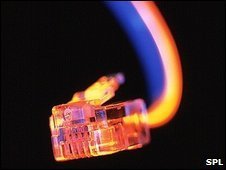
The Digital Economy Bill is currently going through Parliament
|
Plans to suspend the internet accounts of people who download music illegally are unfair, according to the head of Britain's biggest telecoms firm. British Telecom's chief executive, Ian Livingston, said illegal file-sharers should be fined instead of cut off. He and other industry figures from Firms such as Google and Facebook have written to the Financial Times urging changes to the Digital Economy Bill. The bill is going through Parliament and was welcomed by the music industry. It is seen as a weapon in the battle against online piracy. But Mr Livingston says plans to suspend internet access for file-sharers goes against natural justice.
"If someone is accused a fine can be issued, a bit like a speeding offence," he told BBC News. "They can appeal it. If they don't appeal it then they pay a fine." He said the money generated by fines could be used to compensate the creative industries or even to support the rollout of broadband across the UK. He said his proposal would not penalise whole families - or potentially small businesses - for the action of one person. "I'm trying to be constructive, not destructive," he said. 'Net threat' Mr Livingston is one of several leading industry figures who have now written to the Financial Times with concerns about other aspects of the Digital Economy Bill.
 |
DIGITAL ECONOMY BILL
Legal framework for tackling copyright infringement via education and technical measures
New duties for Ofcom to assess the UK's communications infrastructure every two years
Modernising spectrum to increase investment in mobile broadband
Framework for the move to digital radio switchover by 2015
Updating Channel 4 functions to encompass public service content, on TV and online
Age ratings compulsory for all boxed video games aimed at those over 12 years
|
The letter, signed by representatives of Facebook, Yahoo, Google and numerous Internet Service Providers says that a recent amendment to the bill - known as 120A - could have "unintended consequences which far outweigh any benefits". The amendment passed in early march with support from the Liberal Democrats and the Conservatives, would allow courts to use injunctions to force internet service providers (ISPs) to block certain websites that facilitate illegal file-sharing. But the firms say the amendment could "threaten freedom of speech and the open internet, without reducing copyright infringement as intended". "To rush through such a controversial proposal at the tail end of parliament, without any kind of consultation with consumers or industry, is very poor lawmaking," the letter reads. The signatories, which also include BT, Virgin Media, Carphone Warehouse and Orange, say the bill could have "an adverse impact on the reputation of the UK as a place to do online business". The amendment replaces the controversial Clause 17 of the Digital Economy Bill, which was also opposed by many technology firms in the UK. Controversial clause The original clause would have given the Secretary of State broad powers to amend copyright laws to respond to new forms of online infringement.
 |
A season of reports from 8-19 March 2010 exploring the extraordinary power of the internet, including: Digital giants - top thinkers in the business on the future of the web
Global Voices
- the BBC links up with an online community of bloggers around the world
|
It was defeated by the House of Lords in March, but replaced by the new amendment. The music industry welcomed the new addition to the Digital Economy Bill when it was passed and said that any claim it could lead to "blocking based on accusation" was unfounded. "It is highly unlikely that a court would order blocking of websites that adopt responsible copyright policies, including effective take-down procedure," Geoff Taylor of music industry body the BPI said at the time. The Digital Economy Bill was outlined in the Queen's speech in November 2009 and has been hotly debated ever since. One of the most controversial elements is the so-called "three strikes rule" that would give regulator Ofcom new powers to disconnect or slow down the connections of persistent net pirates. The bill will have its third and final reading in the House of Lords next week, before it goes back to the Commons. Commentators have suggested it may be forced through before the upcoming General Election.
|

~RS~q~RS~~RS~z~RS~22~RS~)

~RS~q~RS~~RS~z~RS~22~RS~)
Bookmark with:
What are these?